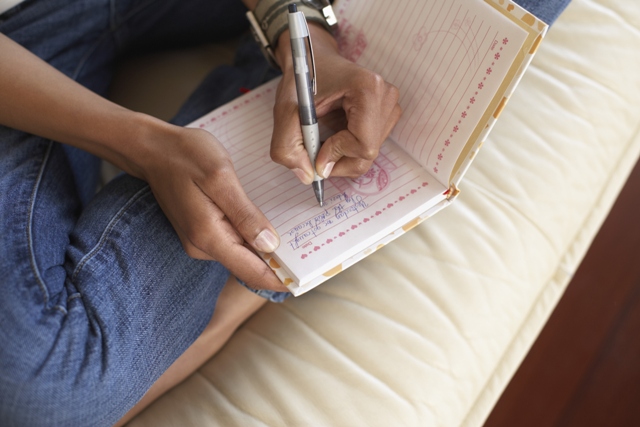
Editor’s note: This article is the 10th in an A-Z series on issues related to creative blocks. This month we look at how journaling can help.
One of the most effective ways to access the origin of our creative content is to spend some time reflecting, free associating, and journaling. It is no secret that brainstorming is responsible for some of the greatest ideas. Tina Seelig, professor and author on the topic of creativity, teaches courses on the importance of encouraging wild ideas, deferring judgment, and coming up with as many ideas as possible.
Feeling creatively blocked can be frustrating and discouraging. Often, people in therapy express doubts about their creative career paths simply on the basis of feeling creatively blocked. Increasing their confidence in their ability to think creatively tends to produce more creative thinking, which, in turn, leads to greater levels of satisfaction with their creative work, both in process and outcome.
When I recommend that people begin journaling, there is usually some ambivalence about it. It might seem too time-consuming, too difficult, too unfamiliar, and there may be doubt about its effectiveness. However, after spending a few hours journaling, most observe the following:
- Increased motivation and enthusiasm to continue creative work
- Original ideas surfacing
- Acceptance of the nonlinear process of creative work (and fewer “shoulds”)
- A more concrete idea of what they wish to express
- A deeper exploration of their thought associations
So, what does journaling entail, exactly? What is the method?
It is important to become comfortable with the idea that there is no correct way to journal. Whatever feels representative of where a person is, in the moment, works!
Here are some possibilities to get you started:
Start Wide
Begin by documenting every thought that enters your head. Regardless of whether it makes sense or connects to the rest of your thoughts, just allow your flow of consciousness to move freely.
Start Narrow
Begin by noticing one point of interest—a conversation you overheard, a smell coming from a bakery, the sound of water trickling, the sight of an animal running, a single memory. Try to document as many characteristics you can come up with about the particular stimulus and see where this takes you.
Look Inward
This is about self-reflection and introspection. Start by asking yourself what you are trying to say through this novel, art piece, story, song, etc., what matters to you, what motivates you about the work, and how it will make you feel.
Look Outward
Imagine your work as part of a larger series of works produced and/or received by other people. The idea is that by understanding that you are communicating some type of message and leaving your creative stamp—which may or may not be seen by others—you are contributing to a larger collective of creative work. Journal about what inspires you in others’ work and how you would like your work to be inspiring.
© Copyright 2015 GoodTherapy.org. All rights reserved. Permission to publish granted by Olga Gonithellis, MA, MEd, LMHC, Creative Blocks Topic Expert Contributor
The preceding article was solely written by the author named above. Any views and opinions expressed are not necessarily shared by GoodTherapy.org. Questions or concerns about the preceding article can be directed to the author or posted as a comment below.

 Creative Blocks from A to Z: Immersion
Creative Blocks from A to Z: Immersion Creative Blocks from A to Z: Happiness
Creative Blocks from A to Z: Happiness Creative Blocks from A to Z: Goals
Creative Blocks from A to Z: Goals